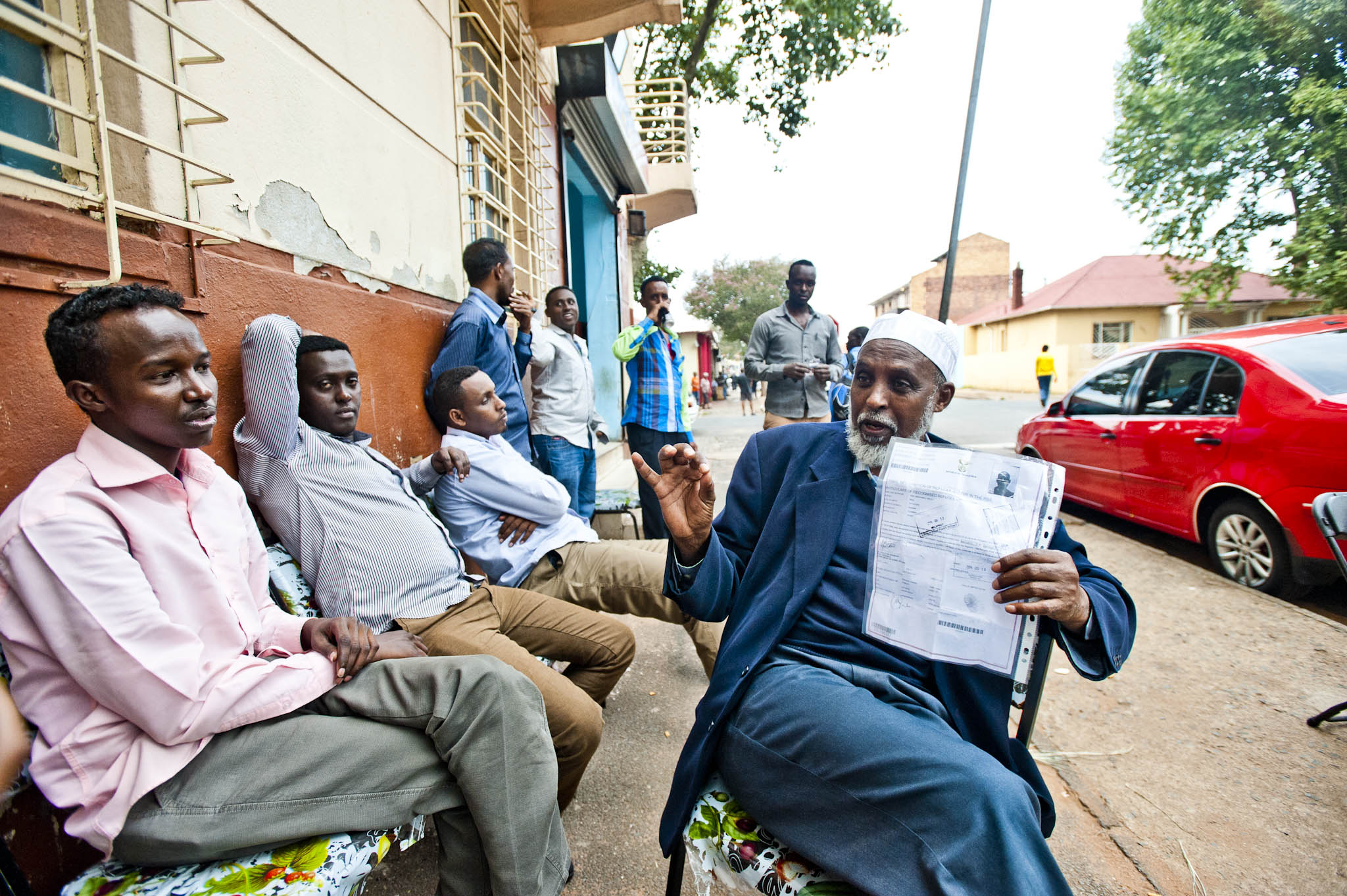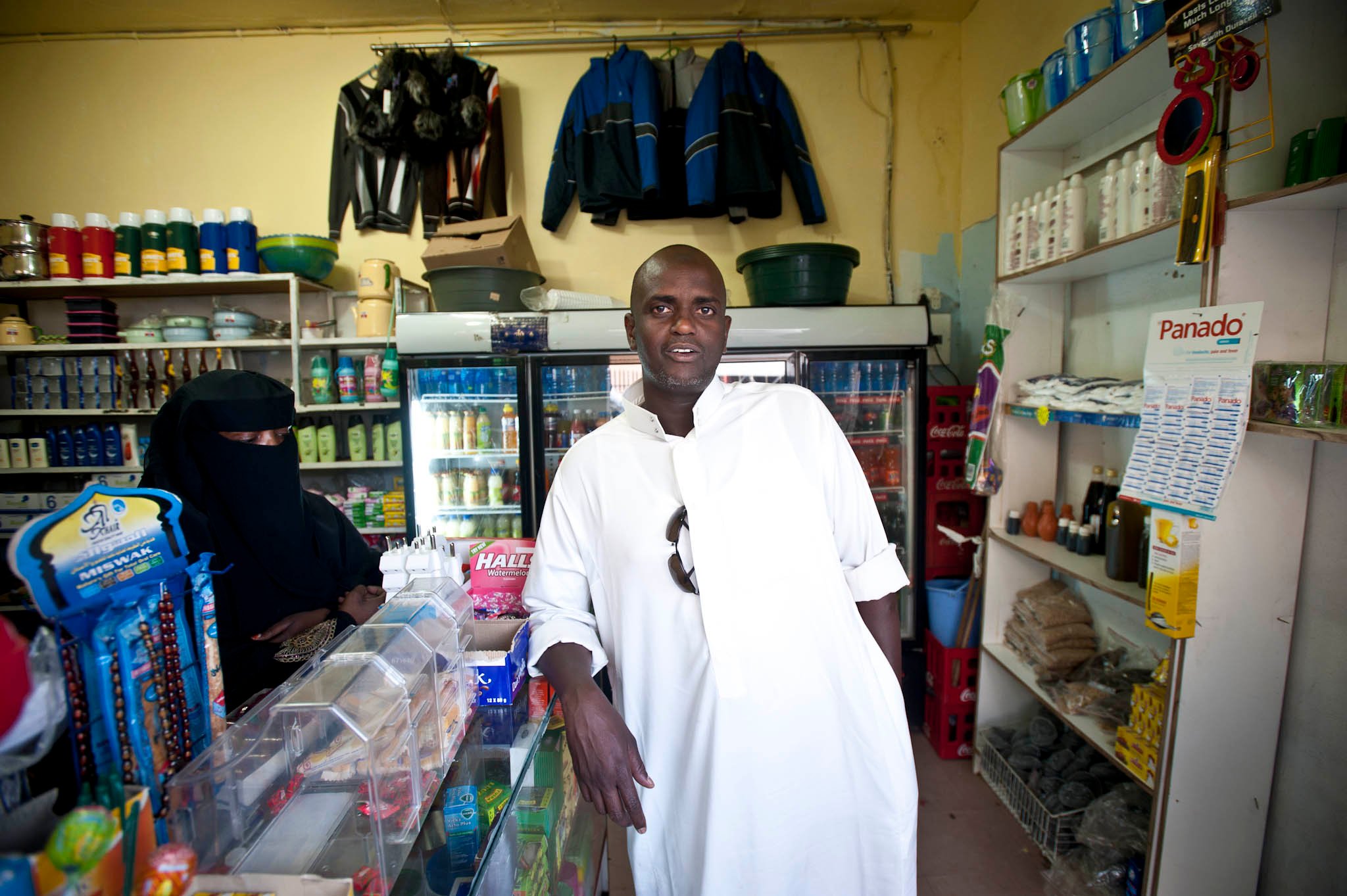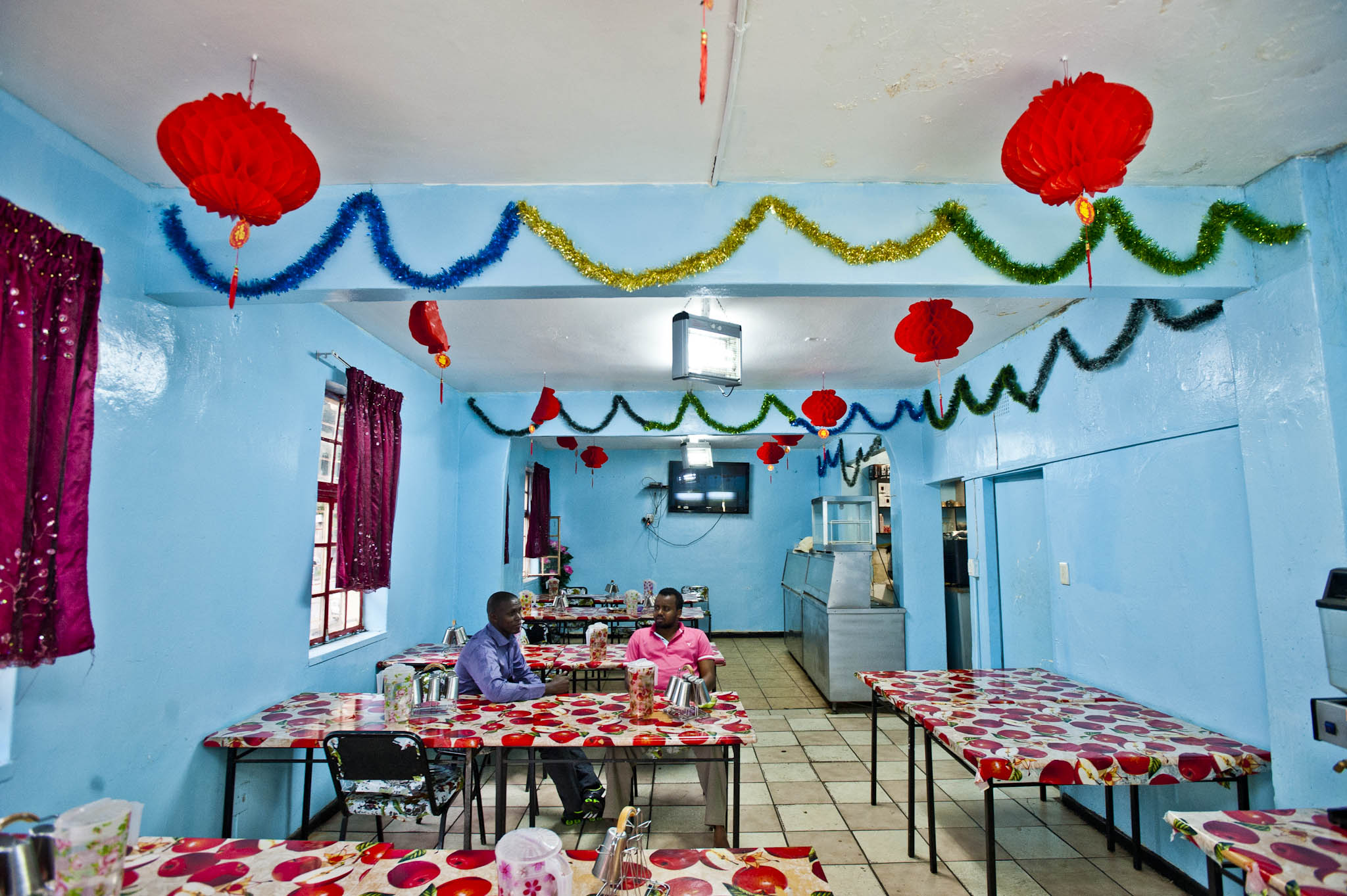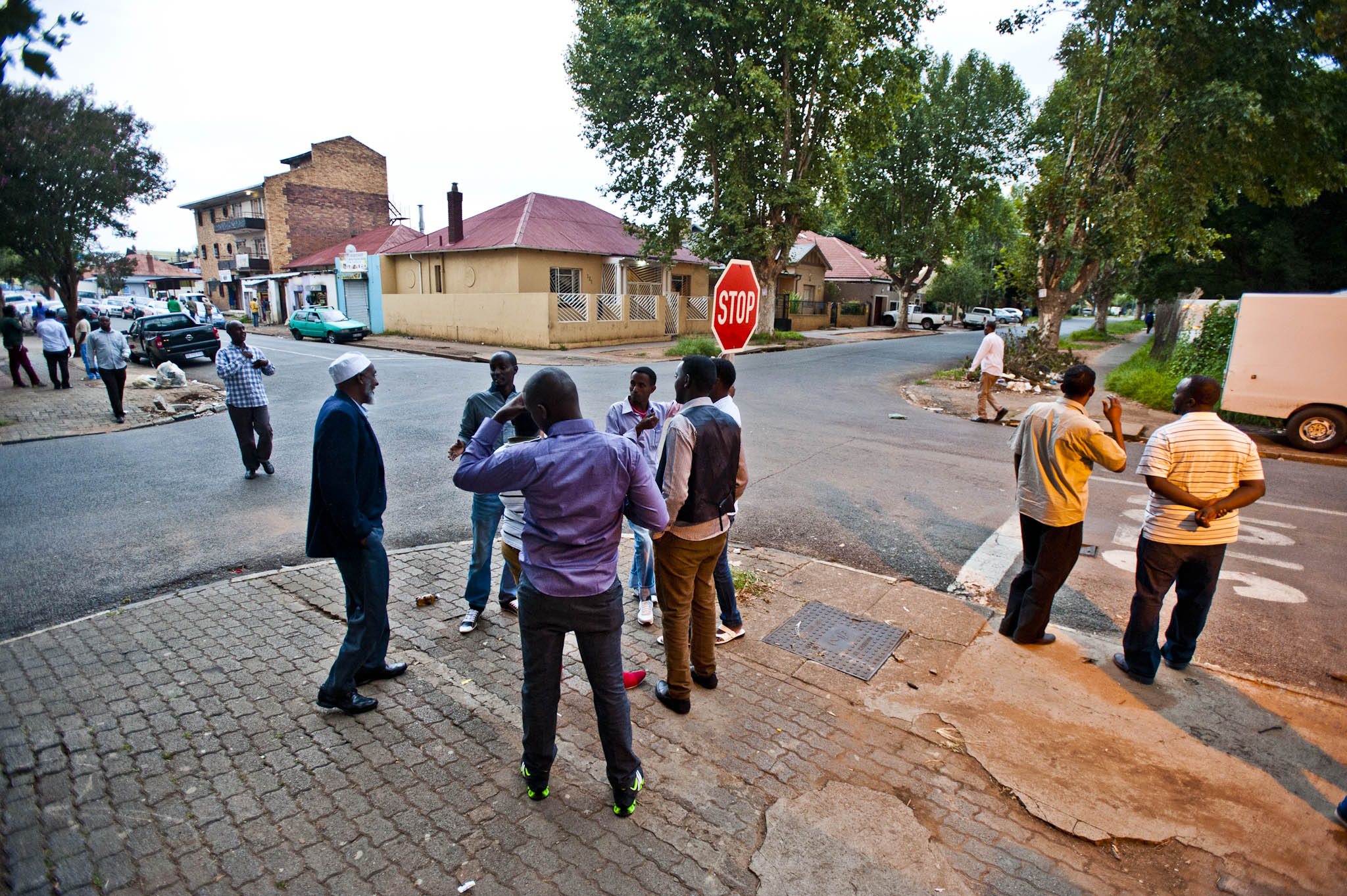Saidi Ahmed Muhammed and his family are sharing the single sleeping area of his rented
The recent spate of looting, mostly in Gauteng townships, has again brought attention to the stasis that asylum seekers find themselves in.
In a weekend visit to Mayfair to “calm tempers down”, Gauteng Premier David Makhura said that foreign shopkeepers should have trading licences and pay taxes “so we can protect you”. He also uttered a stern warning against the use of illegal firearms, telling them “we know where you buy your illegal firearms”.
As the looting spread to the East Rand and thousands of people fled to Mayfair, Somali, Bengali and Ethiopian shopkeepers told of the difficulties they had in legitimising their businesses and defending them legally.
‘If we kill someone, it’s a big thing’
After the premier’s departure, a lanky, greying Somali businessperson, Abi Nuur Mohamed, said that it was as if Makhura had “thrown a bomb and ran” away.
Mohamed explained that many Somali business owners wanted to abide by the law but, for many, their status as asylum seekers made it difficult for them to obtain trading licences and qualify to legally own firearms. “If you have documents, like an ID and a passport, or even refugee status, then it’s easy to get a trading licence. Like myself, I have a British passport; it’s easy.”
On the question of obtaining legal firearms, Mohamed says people often contravened the law to protect their lives.
“We’re not soft. We will defend ourselves,” said the fez-wearing Mohamed, index-finger wagging for emphasis.
“If we get killed – and there has been plenty of that – it’s nothing, but if we kill someone in defence, it’s a big thing. The premier is right to say we mustn’t take the law into our own hands, but our lives are in our hands.”
For Mohomed Diiriye, it has been 12 years, and counting, without permanent residence status.
Seated around a table at the popular Ebrahim’s coffee shop, he said: “The attitude of the home affairs people, I’m ashamed. For 12 years using A4 papers [a reference to his continued status as a refugee], I can’t even open a bank account. You can’t even apply for a passport with A4 papers. It’s like we’re prisoners here. I haven’t seen my mom in 14 years.”

The A4 paper confirming refugee status. (Photos: Delwyn Verasamy, M&G)
Caught napping in Soweto
Diiriye, who had been in business in Soweto since last year, said the attacks there caught everybody napping, but other shopkeepers said there had been an element of co-ordination in parts of Soweto.
“In 2008 the xenophobic attacks happened all over South Africa but not in Soweto,” he said. “That’s why I thought Soweto was safe.
“Somalians find it difficult to survive in town. You need cash and facilities. The rent is about R85 a square metre and a [decent-sized] shop is about 200 or 300 square metres. And then you’ll need probably three, four workers. Their salaries might be relatively high because they need to get accommodation and transport money.”

“It’s like we’re prisoners here.” – Mohomed Diiriye
Somali Community Board (SCB) chair Amir Sheikh said that, since Monday, there were more than 700 documented cases of Somalian, Ethiopian and Bengali-owned shops being looted. This was plunging Mayfair into a worsening humanitarian crisis as scores of displaced shopkeepers from the East Rand and Soweto continuing to pour into the suburb.

A Somali restaurant in Mayfair.
“Mayfair is very flooded,” said a tired-looking Sheikh on Monday evening, outside the Nura Community Hall. As he spoke, an open-top van off-loaded goods into a storeroom near the hall. “You’re looking at plus/ minus 1?000 shop owners that have come in. But now remember that every shop would have about three people. So you’re looking at about 3?000 people that have been uprooted.”
Nowhere to go
Many of the displaced were staying in lodges around Mayfair, at discounted prices. Others were living with friends, family or with other people who had offered them their homes.
Sheikh said the SCB was neither prepared nor trained to deal with the scale of the crisis, but was grateful to everybody who contributed moral or physical support.
Signs that Mayfair was bursting at the seams were not only on street corners, where bands of young men hung around aimlessly, but in overcrowded buildings that had become refugee camps.

Some of the Somali community in Mayfair.
In a flat off Albertina Sisulu Street, one of Mayfair’s main arteries, 35-year-old Saidi Ahmed Muhammed told of how he was still trying to pay off the loan for a business he lost in 2011 in a Lesley, Mpumalanga, arson attack.
Men broke into the shop while he and his family were asleep and poured acid on his wife’s back. They forced the family out the shop before looting it and setting it alight.
The Soweto lootings, he said, had put him out of business for a second time, which meant he would have to raise a third concurrent loan.
His Ethiopian business partner, their three assistants and his family of four are currently sleeping in the single sleeping area of his rented, subdivided flat. Muhammed’s four-year-old daughter Sa’ada, with flat, ear-length plaits, is sprightly but she breathes with a wheeze.
“She was operated on in Mpumalanga in 2013 but can no longer receive treatment at Gauteng hospitals as her birth and hospital records went missing in the 2011 fire.”
The burly, clean-shaven Muhammed said he had been to Evander Hospital in Mpumalanga more than four times with the requisite affidavit but her records could not be verified.
“She needs to get checked up but she hasn’t gone since the operation,” says Muhammed. “She had an oxygen nebuliser. That helped but it also got burned in Lesley.”
According to the National Health Act, foreign patients without any documentation or permits cannot be refused emergency medical treatment.
A Mail & Guardian story titled “Xenophobia violates Health Act and migrants’ rights to care”, detailed how, in contradiction of the Act, a guideline document was circulated to health workers in Gauteng last year, which “requires a migrant patient without documentation to pay in full before accessing healthcare services”.